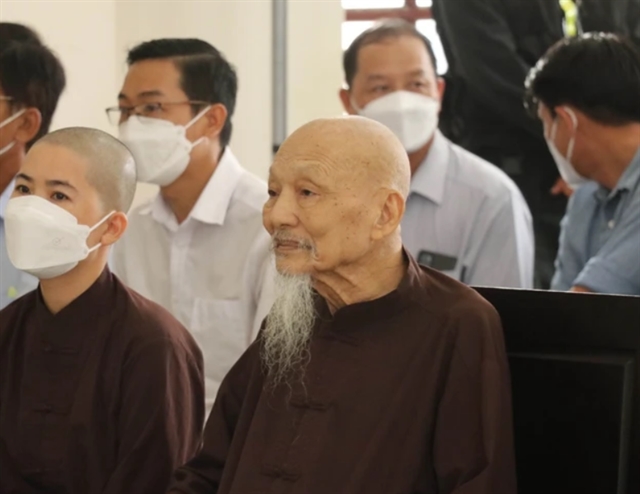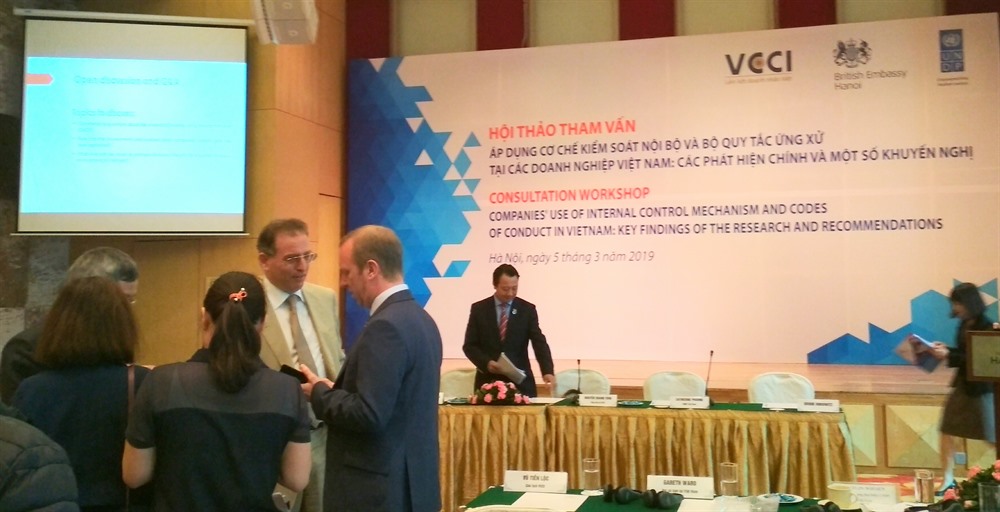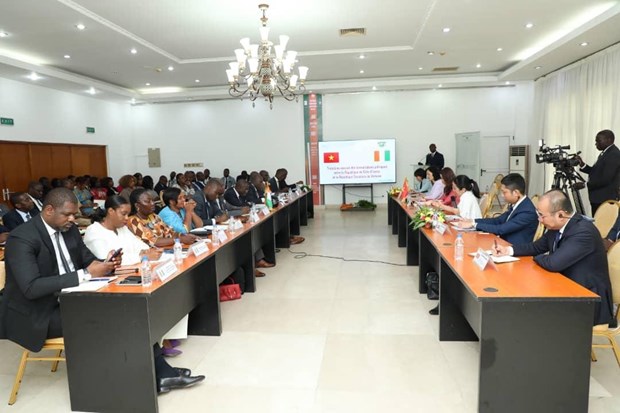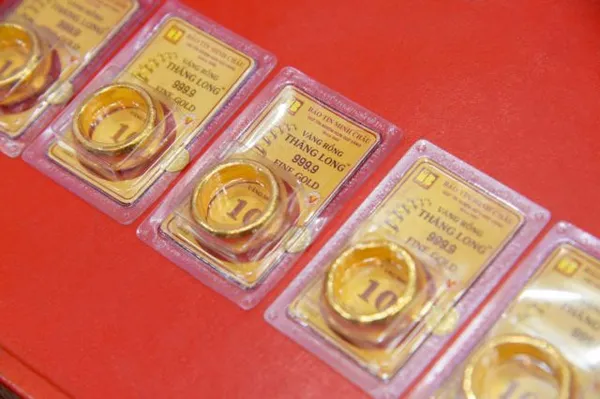 Society
Society

A strong internal control system would enhance efficiency and profitability and reduce risks and costs for companies, said Brook Horowitz, CEO of IBLF Global – a UK-based non-profit organisation promoting responsible business practices.
 |
| Yesterday’s workshop on internal control mechanisms and codes of conduct. — VNS Photo Bích Hường |
HÀ NỘI — A strong internal control system would enhance efficiency and profitability and reduce risks and costs for companies, said Brook Horowitz, CEO of IBLF Global – a UK-based non-profit organisation promoting responsible business practices.
Speaking at a workshop on companies’ use of internal control mechanisms and codes of conduct yesterday, Horowitz said Việt Nam was growing fast and a clear commitment to business integrity by the Government and firms could make the Vietnamese economy more attractive for international investment and trade.
However, he said the latest Provincial Competitiveness Index (PCI) reports – annual reports conducted by the Việt Nam Chamber of Commerce and Industry (VCCI) and the US Agency for International Development (USAID) since 2005 – showed that corruption was widespread both in the State and non-State sectors.
According to PCI, from 2011 to 2017, 51-65 per cent of surveyed enterprises said they made informal payments or bribes.
The rate of firms making informal payments worth more than 10 per cent of their revenue increased from 7 per cent in 2010 to more than 10 per cent in 2014.
Despite that, 80 per cent of firms said they believed informal payments are at an acceptable level
“Paying bribes has become more widespread in recent years, contrary to the Government’s efforts and the public’s expectations,” Horowitz said.
Corruption in business has drawn attention from Việt Nam’s Government and public as businesses are both victims of corruption and one of its causes.
Việt Nam’s revised Anti-Corruption Law was passed by the National Assembly on November 20 2018 and is due to come into force in July this year. It adds regulations related to corruption in the private sector.
Under the revised law, “enterprises and other economic organisations shall issue and carry out their Code of Conduct (CoC) and Internal Control Mechanism (IC) in order to prevent conflicts of interest, prevent corrupt acts and establish a healthy business culture without corruption.”
According to the Committee of Sponsoring Organizations of the Treadway Commission (COSO), IC is a process set by an entity’s board of directors and management, designed to provide reasonable objectives relating to the operations, reporting and compliance.
IC is intended to make financial and accounting information more reliable and prevent fraud.
VCCI chairman Vũ Tiến Lộc said the revised law would expand the scope of regulations to cover the non-State sector, helping it move towards a fair and transparent business environment.
In Việt Nam, big companies often establish IC committees but these bodies have limited power because they rely heavily on the board of directors.
Lộc said small- and medium-sized enterprises do not pay attention to IC and lack the resources to employ personnel that focus on strengthening it.
He added that when IC is not applied or is applied improperly, fraud could happen in the company and could even spread through global supply chain.
Caitlin Wiesen, the United Nations Development Programme (UNDP)’s Resident Representative, applauded the revised law.
She said it demonstrated the intention of the Vietnamese Government to combat corruption in all areas of society and implement the requirements of the United Nations Convention against Corruption.
The new provisions align with the UN Convention Against Corruption (Article 12), which obliges states to take measures to “prevent corruption involving the private sector, enhance accounting and auditing standards in the private sector and, where appropriate, provide effective, proportionate and dissuasive civil, administrative or criminal penalties for failure to comply with such measures.”
“The adoption of the new law also shows the commitment of Việt Nam to implementing Goal 16 of the Agenda 2030 for Sustainable Development Goals in which ‘substantially reducing corruption and bribery in all their forms’ is one of its key targets,” Wiesen said.
“UNDP stands ready to deepen its support to Việt Nam in its efforts to address corruption in all its forms and improve business integrity,” she said.
Last year, VCCI’s Office for Business Sustainable Development, Toward Development and Integration and IBLF Global jointly conducted a survey on companies’ use of IC and codes of conduct in Việt Nam. The survey was conducted under the UNDP’s project "Promoting a fair business environment in ASEAN" funded by the UK Government’s Prosperity Fund. The survey received answers from 239 firms.
According to Dr Nguyễn Văn Thắng from the National Economics University, the survey’s lead researcher, it found that informal payments are a common part of business-to-Government interactions. According to the survey, 74 per cent of respondents had paid informal fees and 57 per cent of them said these fees could help facilitate their business.
In business-to-business interactions, irregularities happen in purchasing (for example, unmatched demand or poor quality), sales (fictitious sales, unmatched contracts and inaccurate invoices) or in human resource management (relationship-based hiring and incorrect payments).
Thắng said that up to 60 per cent of surveyed firms were aware of the accepted definitions of IC and code of conduct. Others mistakenly believed that IC is the job of internal audit committees, that it is about financial control or that there is one IC system that requires a big investment. — VNS









